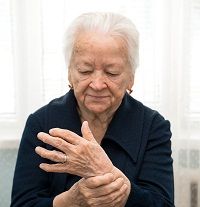Article
Rheumatoid Arthritis Treatment Baricitinib Succeeds in Phase 3 Trial
Author(s):
Researchers from Stanford University Medical Center studied patients with inadequate or unacceptable side effects associated with one or more tumor necrosis factor inhibitors or other biologic DMARDs, or both.

Baricitinib was effective in a phase 3 drug trial for refractory rheumatoid arthritis (RA), according to findings published in the New England Journal of Medicine.
Researchers from Stanford University Medical Center studied 527 patients with inadequate or unacceptable side effects associated with one or more tumor necrosis factor inhibitors or other biologic DMARDs, or both. The patients — who had been living with RA for an average of 14 years – were randomized to receive baricitinib at a dose of 2 or 4 mg daily or placebo for a period of 24 weeks. The researchers tested the efficacy of baricitinib based on American College of Rheumatology (ACR) 20 percent response, the Health Assessment Questionnaire Disability Index (HAQ DI), the Disease Activity Score and a Simplified Disease Activity Index (SDAI) score of 3.3 or less.
More than half (55 percent) of the patients in the 4 mg daily baricitinib dose experienced a reduction of at least 20 percent in the number affected joints after 12 weeks. At baseline, these patients had at least six joints affected. About half (49 percent) of the 2 mg daily baricitinib dose experienced a similar reduction, the researchers reported, though only about a quarter of the placebo patients experienced the reduction of affected joints.
Baricitinib patients also demonstrated improved physical function and reduction in inflammation markers when compared to the placebo group. This remained mostly true after 24 weeks, the researchers said.
The drug works by interfering with the intracellular enzymes whose signaling action is required for a combination of inflammatory substances in the body to work, the researchers explained in a press release.
“This is the first drug to demonstrate meaningful clinical benefit in patients who’ve failed virtually every other commercial drug for RA,” Mark Genovese, MD, said in the statement. “It’s an ever growing population.”
The researchers also reported a risk for herpes zoster virus, or shingles. At 12 weeks, in the 4 mg daily baricitinib group, there was about a 2 percent risk, followed by a 1 percent risk and 0.5 percent risk in the 1 mg daily baricitinib group and placebo groups, respectively. By 24 weeks, the risk to the corresponding groups was 4 percent, 1 percent and 1 percent, respectively.





